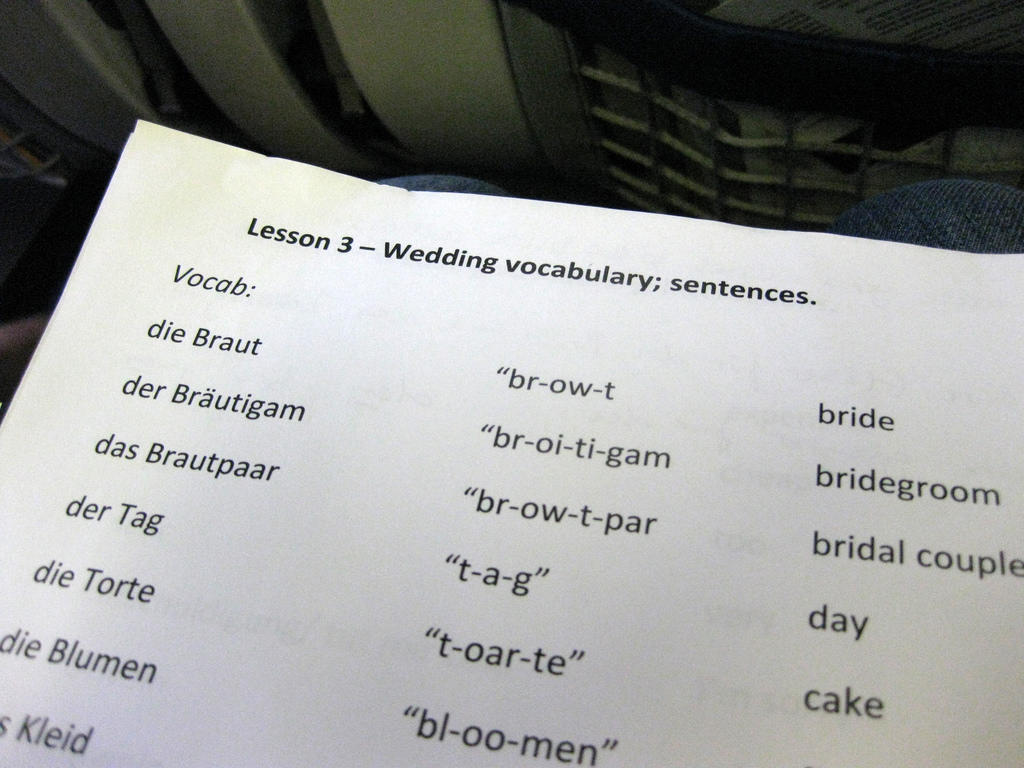Mark Twain once wrote an essay called "The Awful German Language". We don't agree, of course, but German is certainly a difficult language and not always easy. From compound words to whole new letters to regional dialects and slang, it’s hard to really become fluent. Finding ways to practice what you learn is not easy either. Here are a few quick tips on the best ways to learn German.

The Best Way to Learn German Compound Nouns
Compound nouns are the plague of anyone studying the German language. While some words that happen to be made out of several other words can be found in the dictionary - like “Wörtebuch” (book of words, dictionary) or Hochwasser (high water or an inundation) - the German language allows almost any two words to be combined into a new one. 
How to Speak German with a Perfect Accent
German is mostly written how it is pronounced, which is why it is important to learn proper German pronunciation. Vowels will tell you how to spell words, and of course the other way around - knowing how spelling works helps you know how to pronounce your vowels correctly. A double consonant will shorten a vowel sound while an “h” or a “consonant + vowel” cluster following it will lengthen it. But of course German has an extra class of vowels. The two dots on top of German vowels - the Umlauts - modify the way they are pronounced. Generally, they correspond to a closing of the mouth and more force when letting air out. Even more difficult in pronouncing German for beginners are the “ch” sounds. One is made in the mouth, by starting with an English “sh” but using the middle of the tongue and letting the air out by the sides. The other is made deep in the throat, by trying to roll a “k” or “g” sound. Another typical German sound difficult for beginners is the “r” - which is rolled, but not at the tip of the tongue, but at the top of the throat - as opposed to in the throat like the second “ch” sound. Confused? Each German sound is explained in more detail here.
Learning German Regional Variations
As if learning German weren’t difficult enough, every region has its variations as the local dialect bleeds into everyday speech even when speaking High German. There is a general north/south differentiation, with many Swiss German and Austrian German variations found equally in southern German. Another divide is East/West between the former Democratic Republic of East Germany and Federal Republic of West Germany. Find and use online German course here. 

Learn to Speak German Slang
Of course, you don’t actually need regional variations for someone fresh out of online German classes to feel lost in German. The vernacular - both simple, everyday speech and actual German slang - is not often found in German language courses. Even something as simple as a “hello, how do you” can sound vastly different than your average “German for Beginners” lessons, with expressions such as “was geht ab?” (how is it going?) and “jein” (both yes and no). As in every language, words for nice and good change every five minutes - how long ago was something neat in English, or totally rad? A German expression for cool can range from sexually arousing/aroused - “Geil” - to being a tool, or rather “der Hammer”. People who aren’t “voll Krass” might be a “Miesepeter” or a “Meckerfritz”, two derogatory terms that include first names - Peter and Fritz - to designate any Tom, Dick or Harry. German names for kids tend to be cute - little mice and dolls scamper around, some of them only three cheeses high - “Dreikäsehoch”. But beware the Lausbuben and Teufelsbraten - those brats are up to no good! Quite apart from such single German slang words, there are typical German expressions that get quite lost in translation. When you ask someone out on a date and they turn you down, they give you a basket- “einen Korb geben”. You might measure something “pi mal Daum” (”Pi times your thumb”) or praise someone “über den grünen Klee (loben)”, over the green clover. Take a German course on Superprof today!
How to Speak German Fluently
Learning these German phrases is only one step toward becoming fluent in German. For that you need to practice your understanding and use your German as often as possible. While German classes and tutoring can help, they are only a few hours a week. To help improve your German outside of your lessons, you have to use it. To understand it better, watch German TV shows and movies, or watch the ones you know in the German synchronised version, if you can get it. Listen to the news or special language podcasts. Take a very good German language course here. 
Learn German With these Apps
It’s not easy to integrate learning German outside a language course into your daily routine. There are a number of helpful tricks and German learning websites and apps that can help you integrate learning to speak German into your busy life. 
How To Get a Grip on German Spelling
While there are many pitfalls to learning German grammar, German spelling is fairly straightforward, especially compared to English. The biggest problem is when encountering older texts, as German spelling was reformed in 1998. The most important thing to remember when switching to writing German is to capitalise all your nouns, not just the proper names. Though it may look odd at first, it has the advantage of letting you know when something is a noun rather than an adjective or adverb. There are some sounds that can be written several ways. For example,
- The ending -ICH sound can be written either -ich or -ig;
- Both “f” and “v” are used for the “f” sound and
- Words with a Greek root, like photography, will be written with an “f” rather than a “ph” as in English.
- The -y endings for subjects such as photography or geography will be written out -ie (”Fotografie”, “Geografie”) as the “y” sound is pronounced like the “ü”, not like the English “y”.
Find out more on German Spelling here such as when to use the “ß” or “Esszett” and when to use a double “s” and what to do with compound nouns with groupings of three of the same letter. Learning any language is hard, and German has its own set of challenges. But it’s worth it as you immerse yourself a language that shares many roots with English and offers a rich and poetic vocabulary, the language of the Minnesänger (German troubadours), of Goethe and Schiller, of the expression “like milking mice” and, of course, of the word
“Rindfleischetikettierungsüberwachungsaufgabenübertragungsgesetz”.
Summarise with AI:
























